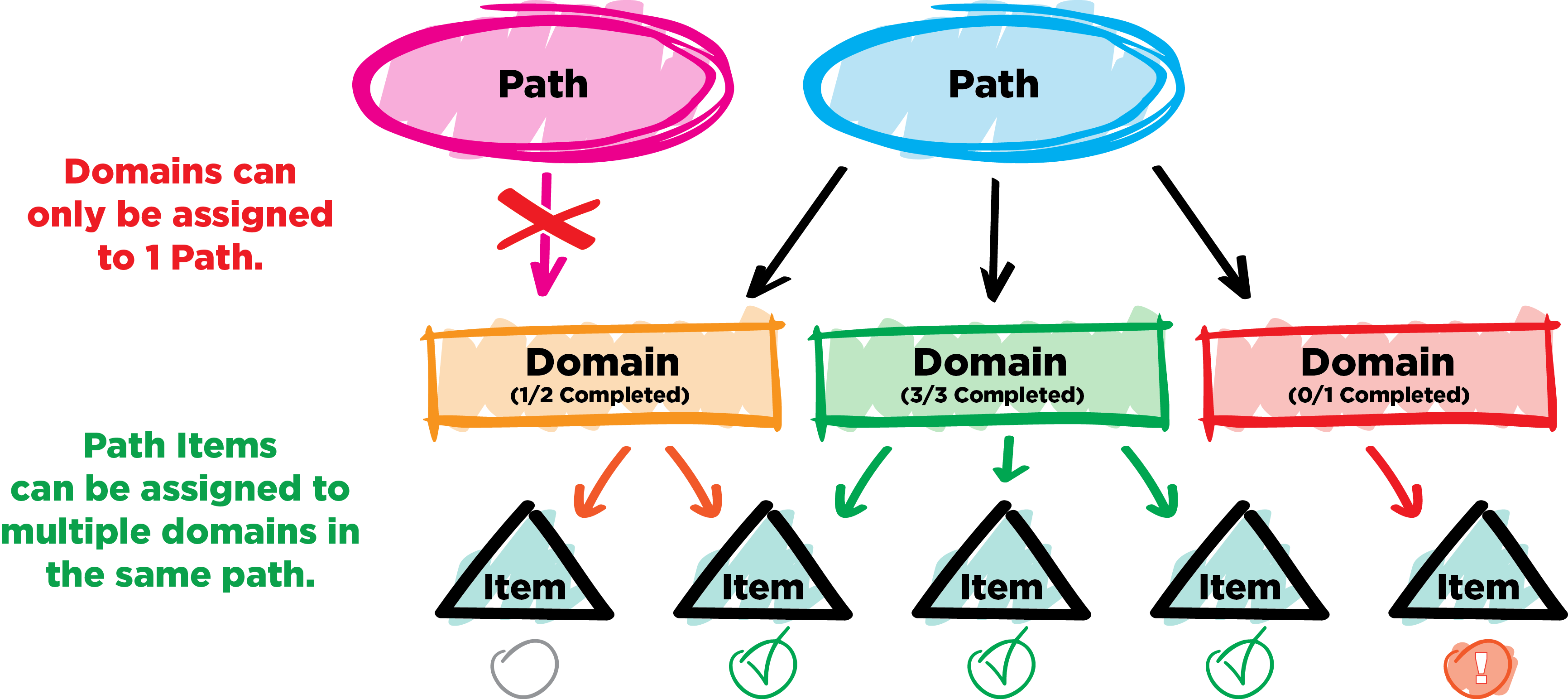Choosing the right domain is crucial for your online presence. It’s the first impression visitors get of your website.
A domain acts like your address on the internet. It directs users to where your website lives. Picking the right domain can impact your brand’s visibility and credibility. It’s important to understand what makes a good domain. Short and memorable domains are usually better.
They stick in people’s minds and are easier to type. In this blog post, we will explore the key aspects of selecting the perfect domain. Understanding these can help you make a smart choice that supports your website’s success. Let’s dive into the essentials of domains and how they can benefit your online journey.
Credit: scaledagileframework.com
Introduction To Domain
Understanding domains is crucial for navigating the internet. A domain name is the address that people type into a browser to reach your website. It is like your home address but for your online presence. Choosing the right domain name can significantly impact your website’s success.
Meaning And Importance
A domain name is your website’s unique address on the web. It helps users find your site easily. Every domain name is unique, ensuring no two websites have the same address. This uniqueness prevents confusion and helps build your brand identity online.
Domains are important for several reasons:
- Brand Identity: A good domain name reflects your brand.
- Credibility: A professional domain name builds trust.
- SEO: Search engines use domain names in their ranking algorithms.
Types Of Domains
There are several types of domain names. Each serves a different purpose.
| Type | Description |
|---|---|
| Top-Level Domain (TLD) | The highest level in the DNS hierarchy. Examples: .com, .net, .org. |
| Country Code Top-Level Domain (ccTLD) | Specific to a country or territory. Examples: .us (USA), .uk (United Kingdom). |
| Generic Top-Level Domain (gTLD) | Commonly used for general purposes. Examples: .edu (education), .gov (government). |
Understanding the types of domains helps you choose the best one for your website. This choice can influence your site’s reach and effectiveness.
Domain Name System (dns)
The Domain Name System (DNS) is like the internet’s phonebook. It translates human-friendly domain names into IP addresses. This makes it easier for users to access websites without memorizing long strings of numbers. Understanding DNS is key to grasping how the internet works. Let’s explore how DNS functions and its main components.
How Dns Works
DNS works through a simple process. When you type a web address in your browser, DNS takes that name and finds the corresponding IP address. Your browser can then load the website. This process involves several steps but happens in milliseconds.
First, your browser checks its cache for the IP address. If not found, it asks the local DNS server. If the local server doesn’t have the answer, it queries other DNS servers. This continues until the IP address is found. The IP address is then returned to your browser, which connects to the web server.
Components Of Dns
DNS has several key components. These include DNS servers, zones, and records.
DNS Servers: These are the backbone of DNS. They store and respond to queries for IP addresses. There are different types of DNS servers, including root, top-level domain (TLD), and authoritative servers.
Zones: A DNS zone is a part of the DNS namespace. It is managed by a specific organization or administrator. Zones help organize the DNS structure and manage domains effectively.
Records: DNS records store data about domain names and their corresponding IP addresses. Common record types include A, AAAA, CNAME, and MX. Each type serves a different purpose, such as mapping a domain to an IP address or specifying mail servers for a domain.
Registering A Domain
Registering a domain is the first step to building your online presence. It gives your website a unique address on the internet. This is crucial for establishing credibility and identity for your brand or personal site.
Choosing A Domain Name
Choosing the right domain name is essential. It should be easy to remember and type. Shorter names are usually better. Avoid using numbers and hyphens. They can confuse visitors. Make sure the name represents your brand or content. Use keywords related to your niche. This helps with search engine optimization (SEO).
Domain Registration Process
Once you have chosen a domain name, you need to register it. Start by searching for the name’s availability. Many websites offer this service. If your desired name is taken, try different variations. Once you find an available name, you can proceed to register it. You will need to provide your contact information. This includes your name, email, and phone number.
After providing your details, you will need to choose the registration period. Domains can be registered for one year or more. Longer registration periods often offer discounts. After selecting the period, you will need to make a payment. Most registrars accept credit cards and other payment methods. Once payment is confirmed, your domain is registered. You will receive a confirmation email with all the details.
Top-level Domains (tlds)
Top-Level Domains (TLDs) are the last part of a domain name. They appear after the final dot in a web address. TLDs are crucial for website identity and credibility. They help users understand the website’s purpose or origin.
Common Tlds
Common TLDs are widely recognized and used across the internet. The most popular TLD is .com. It stands for “commercial” and is used by businesses worldwide. Another popular TLD is .org. It stands for “organization” and is often used by non-profits and charities. The .net TLD is short for “network” and is used by internet service providers and networks. The .edu TLD is reserved for educational institutions. Lastly, .gov is for government entities in the United States.
Specialized Tlds
Specialized TLDs cater to specific industries or communities. The .tech TLD is perfect for technology companies and blogs. The .travel TLD is ideal for travel agencies and tourism websites. The .biz TLD is short for “business” and is suited for small businesses and entrepreneurs. The .health TLD is for healthcare professionals and medical websites. Finally, the .shop TLD is great for e-commerce sites and online stores.
Managing Domains
Managing domains is a crucial part of maintaining an online presence. It involves protecting your domain privacy and ensuring your domains are renewed on time. Let’s explore these key aspects in detail.
Domain Privacy
Domain privacy helps to keep your personal information safe. When you register a domain, your contact details go into a public database. This database is called WHOIS. Without protection, anyone can see your name, address, and email.
To protect your information, consider using a domain privacy service. This service hides your personal details. It replaces them with the contact information of the service provider. Below is a simple comparison of the benefits of domain privacy:
| Without Domain Privacy | With Domain Privacy |
|---|---|
| Your personal details are public. | Your details are hidden. |
| Higher risk of spam and scams. | Lower risk of spam and scams. |
| Potential identity theft. | Protected identity. |
Renewing Domains
Renewing domains is essential to keep your website active. Domains are registered for a set period, usually one year. If you forget to renew, you risk losing your domain.
Here are some tips to ensure you never miss a renewal:
- Set up auto-renewal with your registrar.
- Keep your payment details up to date.
- Use calendar reminders for manual renewals.
By following these steps, you can ensure your domain remains yours. Stay organized and secure your online presence.
Domain Security
Ensuring your domain’s security is vital. Your domain is the online address of your business. It needs to be protected from threats. Domain security involves various measures. These measures keep your domain safe from cyber attacks. Let’s explore common threats and protection methods.
Common Threats
Cyber threats are a growing concern. Hackers use various tactics to compromise domains. Phishing is one common threat. Hackers trick users into sharing sensitive information. Another threat is domain hijacking. This occurs when attackers gain control of your domain. DNS attacks also pose a risk. They manipulate the domain name system to redirect traffic. Malware can infect your domain and harm your website.
Protection Methods
Protecting your domain requires proactive measures. Use strong, unique passwords for your domain accounts. Enable two-factor authentication. This adds an extra layer of security. Regularly update your domain registration details. This ensures only authorized persons can make changes. Monitor your domain for unusual activity. Set up alerts to notify you of any changes.
Consider using domain privacy protection. It hides your personal information from public databases. Secure your website with SSL certificates. They encrypt data and protect user information. Keep your software and plugins updated. This prevents vulnerabilities that hackers can exploit.
Engage a reliable domain registrar. They offer advanced security features. Regularly back up your website data. This ensures you can restore it if compromised. Educate your team about domain security. Awareness reduces the risk of human error.
Domain And Branding
Your domain name is your online identity. It is the first impression people get of your brand. A great domain name can set you apart from the competition. It can make your brand memorable and easy to find. It is a critical part of your brand strategy.
Impact On Business Identity
Your domain name impacts your business identity. It tells people who you are. It can show your business’s niche and values. A clear, concise domain name is easy to remember. It helps people find you online quickly. It builds trust and credibility. A strong domain name can help you stand out. It can make your brand look professional and reliable.
Effective Domain Strategies
Choose a domain name that reflects your brand. Keep it short and simple. Avoid numbers and hyphens. Use keywords that relate to your business. This helps with search engine rankings. Make sure the domain name is easy to spell and pronounce. Check if the name is available on social media. This keeps your branding consistent. Register similar domain names to protect your brand. These strategies can help you build a strong online presence.

Credit: moz.com
Future Of Domains
The future of domains is evolving rapidly. As technology advances, so do the trends and predictions for domain names. It’s crucial to stay informed about these changes. This knowledge helps to maintain a strong online presence.
Emerging Trends
Several new trends in domains are reshaping the digital landscape. Here are some key trends to watch:
- New gTLDs: Generic Top-Level Domains (gTLDs) are expanding. Expect more options like .app, .tech, and .shop.
- Brand TLDs: Companies are creating custom TLDs. For example, .google or .apple, which strengthens brand identity.
- Domain Security: Enhanced security features are becoming standard. Look for DNSSEC and SSL certificates.
- Voice Search Optimization: Domains are being optimized for voice search. Short, memorable names are crucial.
Predictions
Future predictions for domains suggest significant shifts. These changes will impact how businesses and individuals use the web:
- AI Integration: AI will help in domain management. Predictive analytics will offer better domain suggestions.
- Blockchain Domains: Blockchain technology will revolutionize domain security. Decentralized domains will reduce fraud.
- Increased Personalization: Domains will become more personalized. Expect unique extensions tailored to individual needs.
- Growth of Internationalized Domains: More domains will support non-Latin scripts. This trend will enhance global accessibility.
Staying ahead of these trends and predictions ensures a competitive edge. The domain landscape is dynamic. Keep updated to leverage the full potential of domain names.

Credit: engagesupport.campuslabs.com
Frequently Asked Questions
What Is A Domain Name?
A domain name is a unique address used to access websites on the internet. It typically consists of a name and an extension like. com or. org.
How Does A Domain Work?
A domain works by translating human-friendly names into IP addresses. This allows browsers to locate and access specific websites.
Why Is A Domain Important?
A domain is important for establishing an online presence. It helps users easily find and remember your website.
How Do I Register A Domain?
To register a domain, choose a registrar, check availability, and purchase it. The process is usually quick and straightforward.
Conclusion
Understanding your domain is crucial for online success. It impacts SEO, branding, and trust. Choosing the right domain can make or break your website. Keep it short, memorable, and relevant. Do your research and plan carefully. Your domain is your online identity.
Make it count. Stay consistent and keep your audience in mind. A good domain can boost your visibility and credibility. Remember, your domain is the first step in building your online presence. Choose wisely and grow your digital footprint.










